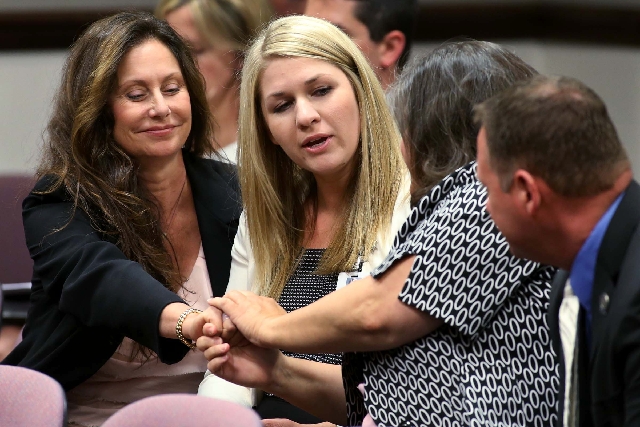DNA bill survives key committee vote in Nevada Assembly

CARSON CITY — A bill to require police to take DNA cheek swabs of anyone arrested on a felony charge won approval, albeit tentatively for several legislators, in the Assembly Judiciary Committee on Wednesday.
Members approved Senate Bill 243, the so-called “Brianna’s Law” bill, named after 19-year-old Reno resident Brianna Denison who was raped and murdered by James Biela in a celebrated case in 2008. Biela later was arrested and convicted and has been sentenced to die.
Sponsors said the law, if it had been in effect at the time, could have prevented the murder since Biela had a previous felony arrest.
A similar bill died in the Senate in the 2011 session, but Brianna’s mother and aunt, along with several national victims’ advocates, had kept pressure on legislators to back the bill.
“It is a great crime-fighting technique,” said Assemblyman Andrew Martin, D-Las Vegas, about Senate Bill 243. The Senate approved the bill 21-0.
But two members of the Assembly committee voted against the bill and four others said they might oppose it once it receives a final vote on the Assembly floor, likely next week. The vote to pass the bill out of the committee Wednesday was necessary to keep it alive through the rest of the session.
Opponents were almost apologetic as Denison’s family sat in the audience.
“I admire the family’s courage,” said Assemblyman James Ohrenschall, D-Las Vegas. “If it were limited to giving DNA only for violent felony arrests, I might be there. But blanket arrests on all felonies is where I differ.”
Assemblyman Richard Carrillo, D-Las Vegas, said he could not support the bill because a person still is presumed innocent until proven guilty in America.
Assemblyman Wes Duncan, R-Las Vegas, said the proposal would help capture criminals.
He noted the U.S. Supreme Court by June is expected to make a decision on whether taking DNA samples violates people’s rights against unreasonable searches. If the bill is wrong, he said the court “will overturn us” and it never will go into effect.
Before passing the bill, committee members approved an amendment to limit the storing of someone’s DNA to three years, not five as the bill was written. But several members expressed concern because there is no automatic expungement of DNA from records if the person is never convicted or the charges are reduced to lesser crimes.
During hearings, some witnesses complained that people arrested on felony charges often are not educated enough or lack the finances to take steps needed to expunge the DNA from their records.
Contact Capital Bureau Chief Ed Vogel at evogel@reviewjournal.com or 775-687-3901.